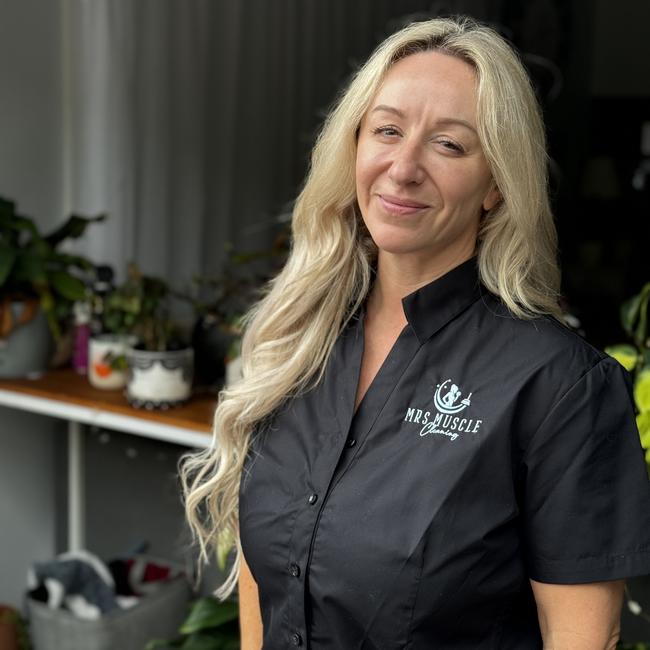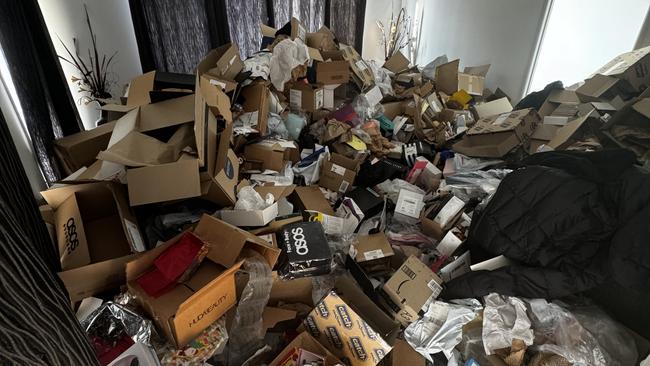Compulsive hoarding: The misunderstood struggle within cluttered walls
A Victorian hoarder was forced to scoop her own excrement into bags, too embarrassed by her messy home to call a plumber. Step into the world of the people tasked with the clean-up.

Leader
Don't miss out on the headlines from Leader . Followed categories will be added to My News.
It’s one of the most misunderstood mental illnesses shrouded in stigma and shame, but beneath the clutter of a compulsive hoarder lies a web of complex emotions overwhelmed by the urge to accumulate.
Hoarding affects 2.5 per cent of working-age Australians and 7 per cent of older Australians, yet it wasonly recognised as a distinctive psychiatric disorder in 2013.
Clinical psychologist and hoarding expert Dr Christopher Mogan said there were very few psychiatric conditions that lead to death, but one of them was hoarding disorder.
“It’s a compulsive drive to acquire things, whether by picking them up from roadsides or buying up at sales or acquiring them from relatives,” he said.
“There are different levels of it, but the worst is when the house is unable to function, and the person can’t even get into the house, leading to a fire hazard.”
Hoarding leads to an inability to discard items and possessions that spill from room to room onto verandas and backyards.
People suffering from compulsive hoarding see their identity in objects rather than relationships, making cleaning jobs more challenging because of their attachments.
There also comes a feeling of shame for the people who suffer from compulsive hoarding, which restricts them from getting the help they require.
Mrs Muscle Cleaning founder Arlene Jayne Bate — an expert in hoarder and squalor cleaning — told the Herald Sun sorting hoarder houses was unlike any other cleaning job due to how emotionally charged the task could be.
“The first thing we always do is build a level of trust and rapport with the client, which is the hardest,” she said.
“We need to use specific language to let them know they make the choices and decisions. And we need to use the right language to support them in making those decisions.”

Ms Bate started her cleaning business four years ago, which has also taken off on TikTok garnering more than a million views on videos of transitioning hoarder houses into functional homes.
“I remember one elderly lady who was living in a unit and desperately needed decluttering because she had plumbing issues and her shower and toilet didn’t work and because her home was so cluttered, she was too ashamed to have any tradesmen come in,” Ms Bates said.
“And so she was doing things like using the toilet and then scooping it out and putting it in a bag because she had no way to flush the toilet.”
The cleaning team worked with the woman for over six weeks and helped her declutter.
“We assisted her in getting her home to a stage where she was comfortable having somebody in the home to fix her plumbing issues.”
Ms Bate and her team often come across cases where people suffering from mental health disorders only get diagnosed very late in life, unable to understand the root of their struggle.
“She’d only recently been diagnosed with ADHD,” she said.
“And what the diagnosis allowed her to understand was that the environment that she was living in was a result of her condition, as opposed to her just being a lazy, dirty person, which is what she felt like before and what everybody else felt like.”
Bookings for cleans of hoarder homes rarely come from the person with the illness themselves.
“We might have them reaching out themselves if they feel brave enough and courageous, but we (mostly) have family and friends who make the call,” she said.
“The main thing for us always is knowing and ensuring we have the client’s permission and they’re engaged with the process because their engagement with the process is the hardest thing to obtain.”

Sometimes, however, it’s authorities who have to call in the cleaners.
“We did one in Bacchus Marsh, and we did not ever get to meet the residents because she had been evicted from the home, and the bank repossessed it,” she said.
It took Ms Bate and her team more than 45 hours to clear the home of all of the possessions.
“It was obvious to us that this lady had a shopping addiction and hoarding addiction and was not able to receive any assistance before … and it impacted us because it could have been a process that could have been stopped if either there was some mental health intervention or maybe even if a friend knew or a family member knew,” she said.
“We find in these situations is that family and friends have absolutely no idea that people are living this way.
“If the lady had received the support she needed, then she wouldn’t have had her home taken from her.”

Dr Mogan said the most common pattern among those suffering from hoarding disorder was isolation.
“They are often not understood within their family, and they’re not included,” he said.
However, in many cases people suffering from the disorder could lead a normal life by going out to work, he said.
“They could be a manager of a bank, they could be a doctor, they could be a psychologist, but in their home, nobody ever visits that home. Nobody can get into the home, and it’s unfortunate to experience,” he said.
“A person who suffers from a hoarding disorder needs to be treated with respect and shown that we can do a step-by-step declutter and give them the sort of living space and home arrangements they deserve.”
Dr Mogan said more could be done in Australia to help people suffering from hoarding disorder.
“We have a situation where in every leafy green suburb, people live in compromised homes, and their health is poor. They’re dying in these homes when they catch on fire, or when their homes are taken away as a result of unsanitary conditions or infestation by pests,” he said.
“Hoarding interrupts people’s relationships, the functioning of their home and impacts on their responsibilities to their children to their elderly, parents, or whatever the case may be — hoarding disorder disrupts lives.”
“This is not an acceptable arrangement for people in our society. But the hoarder has no voice, and people will be dismissive of hoarders and say that they’re squalid people.”
This is not the case.
If you think that you or a family member has signs of hoarding disorder, see a doctor or mental health professional.
For further hoarding related information please contact the At Risk Groups Unit on 1300 367 617




